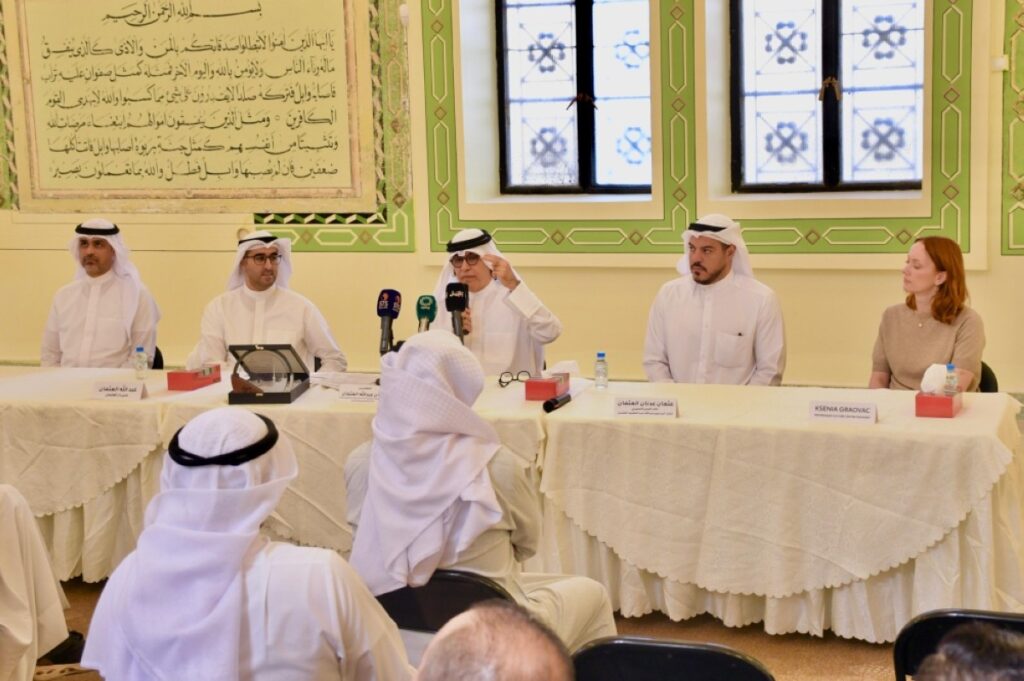KUWAIT: The restoration of Al-Othman Mosque, which has taken nearly a year and a half, is now in its final stages and expected to reopen for prayers by Ramadan, according to Engineer Adnan Abdullah Al-Othman, Member of the Committee of Guardians of Management and Development of the Late Abdullah Abdullatif Al-Othman and Executive Director of Al-Othman Portfolio. At a press conference held Monday at the mosque, which is still under restoration, Al-Othman explained that most of the delays stemmed from the design phase, as the team worked to faithfully replicate the mosque’s original structure.
“Recreating the old design in full detail was not easy,” he said. “We spent a lot of time enlarging and refining old photos and redrawing them to ensure every element was preserved.” The restoration team relied heavily on archival material, including a historic video of the mosque’s inauguration in 1960, filmed by a Lebanese director and provided by the Al-Othman family. “We converted the footage into a digital format in the UK and used it to study the mosque’s original colors, patterns and details,” he added.
Al-Othman also highlighted the mosque’s cultural and historical significance, noting that it was home to Kuwait’s first charitable committee, Zakat Al-Othman, and served as a base for the renowned preacher Hassan Ayyoub in the 1970s. “Many people hold deep memories connected to this mosque,” he added. “All the original elements — from the ironwork, doors, and windows to the terrazzo flooring — were carefully preserved. Whatever was lost, we managed to restore,” Al-Othman noted, emphasizing that the project prioritized authenticity over modernization.
While maintaining the mosque’s historical integrity, the team incorporated modern features to enhance sustainability. “The mosque is now smart,” he said. “Lighting and air conditioning systems can be controlled remotely, and all cameras and devices are connected with the Ministry of Awqaf. We wanted to balance the historical character with modern technology.” The project’s commitment to sustainability and heritage preservation has recently earned regional recognition. During the Gulf Forum for Electricity and Water Conservation, the Late Abdullah Al-Othman Mosque was honored with the Gulf Excellence Award for Energy Efficiency and Conservation of Electricity and Water 2025.
Presented by Kuwait’s Ministry of Electricity, Water and Renewable Energy in collaboration with the GCC General Secretariat’s Committee for Rationalization and Consumer Services, the award recognized the mosque’s exceptional integration of heritage preservation, environmental sustainability, and smart design.
In addition, the mosque recently received a preliminary LEED Gold certification from the US Green Building Council, making it the first mosque in Kuwait and the first heritage mosque in the world to achieve this recognition. The certification highlights the mosque’s pioneering role in integrating green design, energy efficiency and water conservation into a heritage restoration project. This milestone reflects the broader vision of the Late Abdullah Al-Othman Endowment, which redefines charitable work through a holistic approach that merges financial sustainability with social and environmental responsibility.
Ksenija Graovac, Manager of Promenade Culture Center, which is overseeing the documentation of the restoration process, said the project goes beyond renovation — it is an act of cultural preservation. “When the Ministry of Islamic Affairs approached us about renovating the mosque, we realized that we couldn’t do it without proper documentation,” she said. “As we started stripping down the building, we discovered that it had gone through multiple renovations since it was first built in 1958 — an incredibly interesting time for Kuwait, before independence. The mosque had many unique elements that had been hidden over the years.”
Graovac and her team worked to collect every possible source that reflected the mosque’s original appearance — including photos, books, postcards, and, most importantly, a video of the 1960 inauguration provided by the Al-Othman family. “As we worked, we uncovered beautiful patterns, Islamic art, colors, and Quranic scripts that were hidden under layers of paint. The mosque was not just a religious site but a vibrant cultural and community hub,” she said.
Together with heritage specialist Zahra Ali Baba, the documentation team ensured that the work followed international heritage standards. “We carefully uncovered all the original elements, preserved as much as possible from the past, and documented every stage through photography, videography, and oral histories,” Graovac explained. “We hope this sets a new standard for how heritage buildings are handled in Kuwait.” She added that while the mosque remains recognizable, it now features subtle modern updates that align with sustainability goals, such as smart systems, water-saving mechanisms, and added greenery. “Through our documentation, we hope to showcase this journey in books and a documentary feature — from what it was to what it is today,” Graovac concluded.

